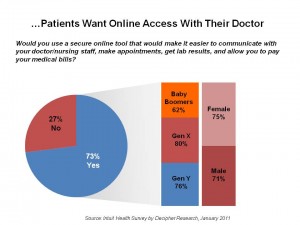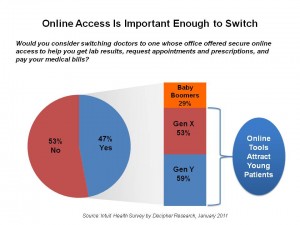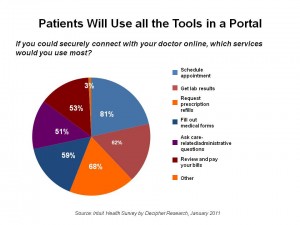 Health consumers are at least as keen to access their medical history online as they are to manage other aspects of their personal lives. Intuit, the people who brought Quicken to the market to help consumers manage their personal financial lives, are keen to do the same for health care. And they’ve got the survey data in The Intuit Health Second Annual Health Care Check Up to make their case for the online personal health information management market.
Health consumers are at least as keen to access their medical history online as they are to manage other aspects of their personal lives. Intuit, the people who brought Quicken to the market to help consumers manage their personal financial lives, are keen to do the same for health care. And they’ve got the survey data in The Intuit Health Second Annual Health Care Check Up to make their case for the online personal health information management market.
It is no surprise that the survey found that 70% of U.S. adults are concerned (very or somewhat) about managing their health care bills and finances (with roughly equal percentages of men and women). However, 8 in 10 people want easy access to their medical history via a secure online tool, and 73% (nearly 3 in 4 people) want online access to their doctor. As the chart illustrates, it’s not only Gen X and Gen Y younger patients who seek online access to physicians; it’s also Baby Boomers, 62% of whom seek secure online tools to communicate with physicians. Patients would be keen to use a variety of services available through an online portal; these services are shown in the second chart.
Among the most popular online services, in order of popularity, would be:
- – Appointment scheduling (81%)
- – Requesting prescription refills (68% – think of this as patient-centered e-prescribing)
- – Accessing lab results (62%)
- – Filling out medical forms (59%)
- – Reviewing and paying bills online (53%), and
- – Asking care-related and administrative questions (51%).
Intuit polled 1,000 U.S. adults online in January 2011.
 Health Populi’s Hot Points: Intuit’s survey demonstrates demand for health engagement, at least when it comes to self-administration of health care services. That people are keen to access lab test results speaks to health engagement of a more clinical sort — that is, knowing one’s numbers sooner rather than later. This is very encouraging data from this lens of health empowerment. This was in fact a data point learned by Kaiser Permanente in its launch of MyHealthManager, the plan’s online personal health record: one of the most popular applications early-on used by KP enrollees was accessing lab results.
Health Populi’s Hot Points: Intuit’s survey demonstrates demand for health engagement, at least when it comes to self-administration of health care services. That people are keen to access lab test results speaks to health engagement of a more clinical sort — that is, knowing one’s numbers sooner rather than later. This is very encouraging data from this lens of health empowerment. This was in fact a data point learned by Kaiser Permanente in its launch of MyHealthManager, the plan’s online personal health record: one of the most popular applications early-on used by KP enrollees was accessing lab results.
Another aspect of health empowerment that the survey revealed is a consumer-patient’s willingness to ‘fire’ their doctor: in this case, to switch doctors if their current physician doesn’t offer secure online access to the kinds of services listed above. As the chart shows, over one-in-two patients would consider switching doctors for another providers who offered a secure online portal with services like online appointment scheduling and lab results access.
Doctors, be warned. You’re now operating in a health consumer-empowered zone.





 Thank you, Trey Rawles of @Optum, for including me on
Thank you, Trey Rawles of @Optum, for including me on  I was invited to be a Judge for the upcoming
I was invited to be a Judge for the upcoming  For the past 15 years,
For the past 15 years,